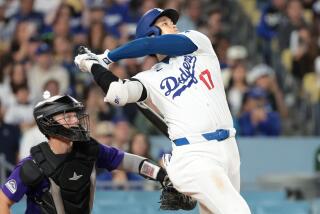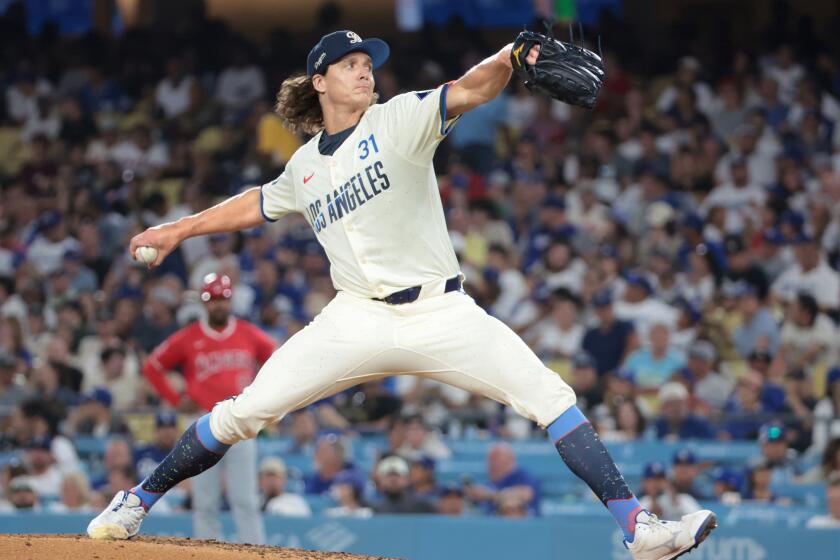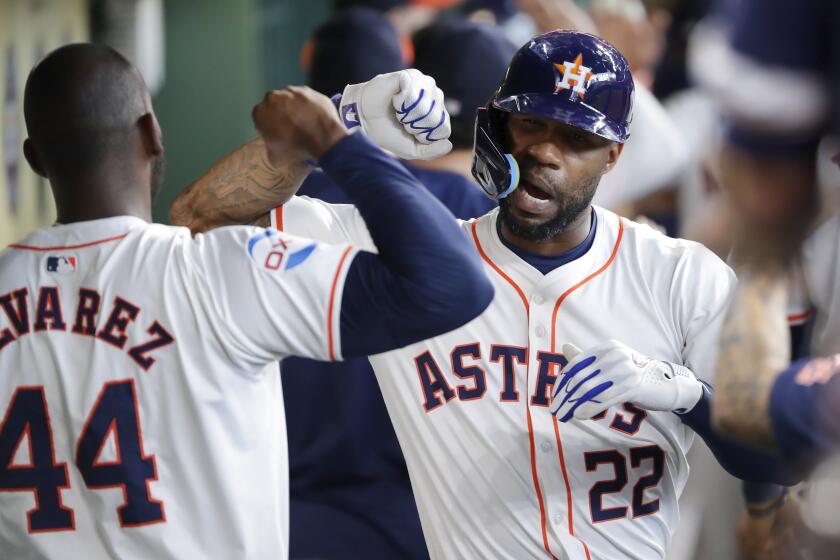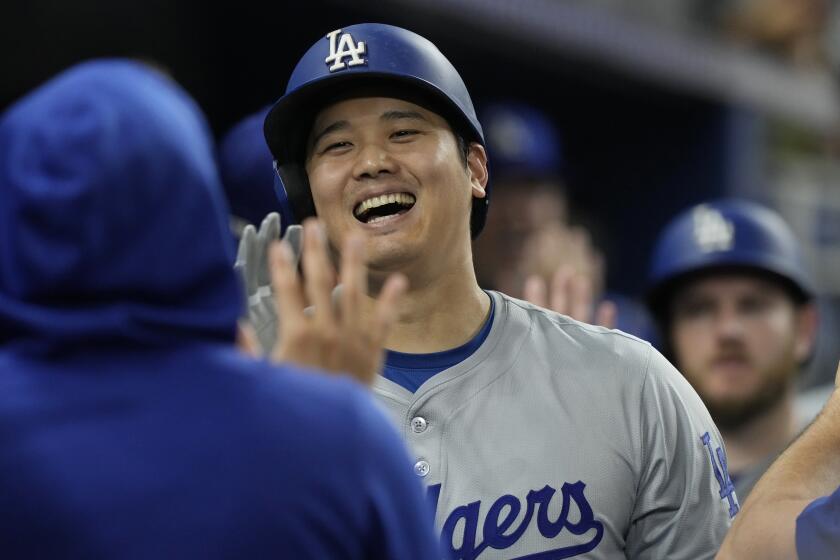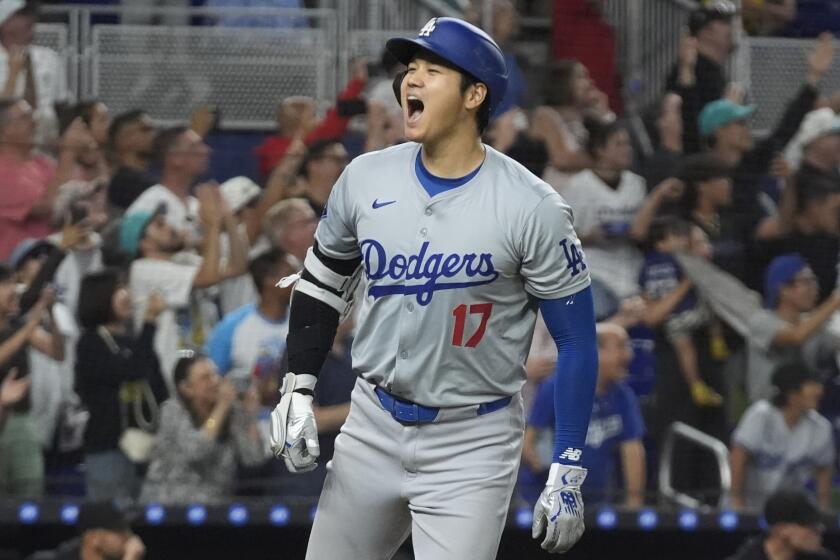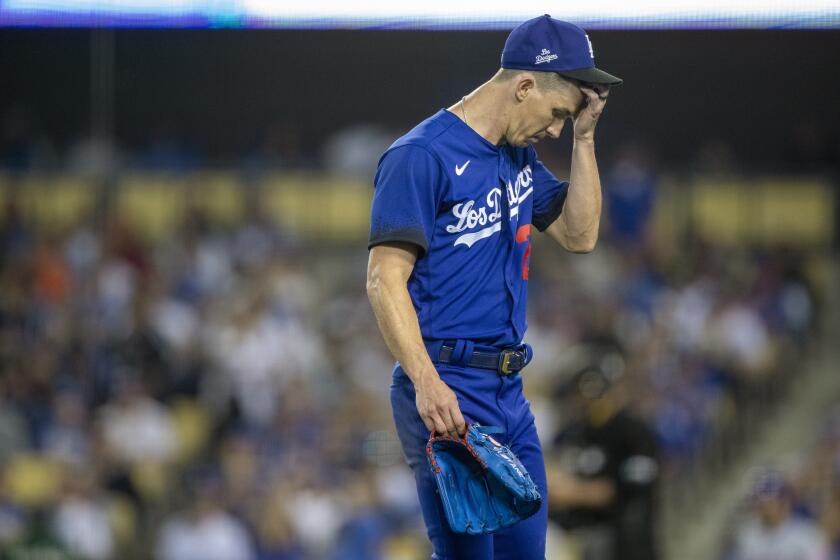Ex-Dodger Juan Pierre off to great start this spring with White Sox
The Dodgers’ season had been over less than 48 hours when General Manager Ned Colletti found himself standing in a dark stadium parking lot with Juan Pierre.
Three years earlier, Colletti had signed the outfielder to a much-ballyhooed free-agent contract — only to see things go horribly wrong. Within a year, Pierre was on the bench and angry.
Yet Colletti, knowing Pierre’s value in the clubhouse and on the bench, refused to trade him. And Pierre eventually proved his boss right, stepping into the lineup last season during Manny Ramirez’s 50-game drug suspension to bat .318, steal 21 bases and help the Dodgers to a division title.
Now it was time to reward him.
“I just happened to run into him and I asked him, ‘What would you like me to do?’ ” Colletti recalled. “And he said he liked L.A., he liked me, he liked [Manager] Joe [Torre]. But if I could find a place where he had a chance to play every day, he would like that too.
“So I gave him my word that if I can find something for you, I’ll do it.”
That something turned out to be a starting job with the Chicago White Sox, who were looking for both an everyday outfielder and a speedy leadoff hitter – roles Pierre fills perfectly. So, two months after that parking lot conversation, Colletti kept his word, trading the 32-year-old for a pair of young right-handed pitchers.
The White Sox will open their spring-training game schedule Thursday afternoon against the Angels at Tempe Diablo Stadium, then play the Dodgers at Camelback Ranch on Friday.
“I’m going to miss him. And I told him that,” Torre said. “I was happy to have the experience with him.”
The warm words — and the even warmer embrace Torre wrapped Pierre in when they visited last week — speak volumes about the outfielder’s rehabilitation with the Dodgers. When Torre and free-agent slugger Andruw Jones arrived before the 2008 season, Pierre was banished to the bench for the first time in his career. And he made no attempt to hide his feelings, sniping at Torre and pouting his way through the summer.
A year later, the Dodgers replaced Jones with Ramirez. Only this time, Pierre accepted his role, becoming both a mentor and role model to stars-in-waiting Andre Ethier and Matt Kemp.
“I miss him already,” Kemp said. “He taught me a lot about staying positive and basically having faith.”
Pierre won’t be totally forgotten — especially on payday. The Dodgers are still on the hook for $10.5 million of the $18.5 million left on his contract. The $7 million they’ll give him this season makes him the fourth-highest-paid player on the team’s payroll.
But he’ll be remembered in other ways as well.
“One of the best guys I ever met in my life,” Ethier said. “There was not a day where me or Matt would [not] have a gripe or a complaint about what might have been going on during the season. And Juan, in the situation he was in, never once said, ‘Look at me. Look at what I’m going through.’ He always was there to help.”
It’s for that, as much as for what Pierre does on the field, that makes the White Sox happy to have him. Stories about Pierre’s work ethic are legendary, starting with his first big-league spring training when then-Colorado Manager Buddy Bell, worried about burnout, ordered him to leave the Rockies’ training complex before workouts even began.
“He is what he is because of the way he works,” said White Sox Manager Ozzie Guillen, who was a coach in Florida when Pierre helped the Marlins to a World Series title. “He’s not taking anything for granted. If I was a rookie and I had that guy on my ballclub, I would make sure to follow his steps. Because they’re going to be the right ones.”
Added White Sox third-base coach Jeff Cox, who was also a coach on that Marlins team: “I would get to the ballpark in spring training. The sun would just be coming up. And there’s Juan Pierre. He’d be in the cages hitting off the tee.
“What he brings not only ability-wise, but team unity-wise, he’s just nothing short of a pleasure.”
Even with the testimonials, and his 459 stolen bases and 165 bunt hits — most among active major leaguers; and baseball’s lowest strikeout rate — once every 18 plate appearances; and his four 200-hit seasons; three seasons with 100 or more runs scored; and eight seasons with at least 40 stolen bases; Pierre has to prove himself anew every spring.
Once that made him bitter. Now, he says, it’s making him better.
“He can’t throw, he can’t hit. I’ve heard this at every level,” Pierre said. “So I have to put in that time preparation-wise to work on my hitting, work on my bunting, taking extra time fielding.
“These little things I have to do. Other guys who can hit the ball 400 feet, I don’t think they necessarily have to do those things. People say it’s work. I just consider it preparation and it’s how I survive.”
Skeptics still ask why, if Pierre is so valuable, he’s with his fifth team in nine seasons. Guillen, for one, hardly sees that as a scarlet number.
“When you come by trade,” he said, “that means you still have value and you’re still important.”
Pierre proved his value last season by winning over even his most vocal detractors — Dodgers fans. After being booed for much of his first two seasons in Los Angeles, Pierre came off the bench to pinch-hit in the seventh inning of a July game at Dodger Stadium and received a long, loud and emotional ovation.
“One of the greatest memories I’ve had in the game,” Colletti said of that night. “I got choked up watching it. Because I know what he went through, I knew how the fans got on him.
“But he never stopped working. And the fans recognized that. That was one of my best days in baseball, seeing that. It’s something that will be with me forever.”
With Pierre as well.
“I think they got a chance to kind of appreciate my game those 50 games that I was in,” said Pierre, who once drew so much ire he refused to read the paper or open fan mail. “I think we came a long way. My game is not pretty, but I think on a daily basis most people respect what I do.
“It’s good,” he added, smiling, “to not be remembered as a jerk.”
Staff writer Dylan Hernandez contributed to this story.
More to Read
Are you a true-blue fan?
Get our Dodgers Dugout newsletter for insights, news and much more.
You may occasionally receive promotional content from the Los Angeles Times.
